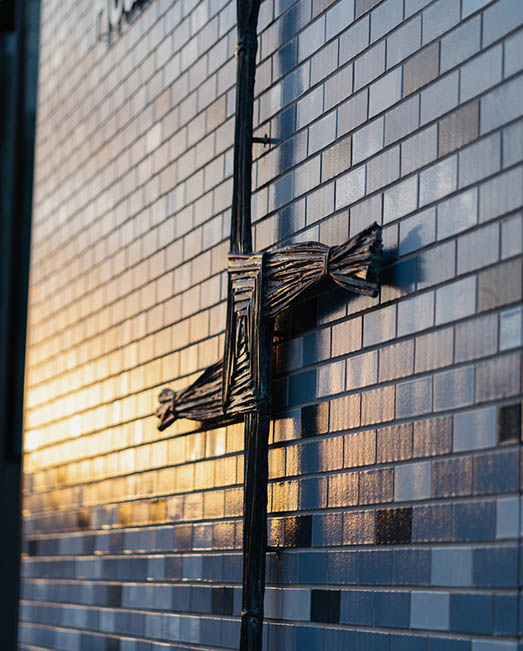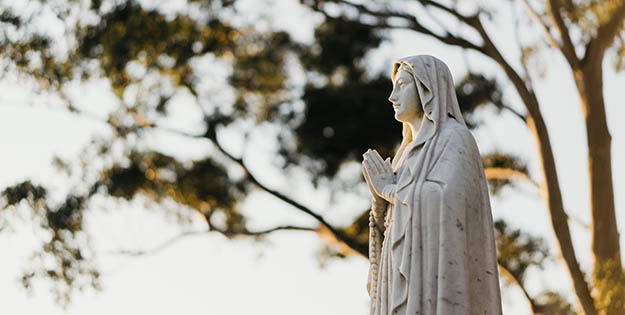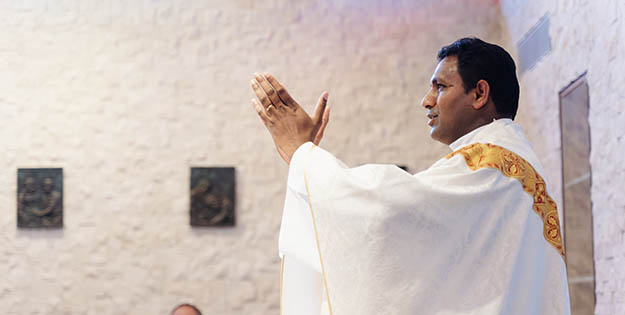Study
Copyright@ Australian Catholic University 1998-2026 | ABN 15 050 192 660 CRICOS registered provider: 00004G | PRV12008
Copyright@ Australian Catholic University 1998-2026 | ABN 15 050 192 660 CRICOS registered provider: 00004G | PRV12008

There’s a common view, amongst both the secular and the faithful, that theology and religious studies are disciplines reserved for those intending to go into ministry or pastoral care: would-be priests, youth pastors, chaplains and the like.
It is undoubtedly true that many students who take courses in these fields are strongly committed to their faith, and go on to pursue careers in faith-based institutions.
But what if you sit somewhere else on the religious spectrum? What if, for example, you question the existence of a divine presence, or see yourself as ‘spiritual’ rather than religious? Should you study religion even if you don’t believe in God?
The answer, according to at least one student of theology, is a resounding ‘yes’.
“Being in this field and not being religious myself, it always surprises me when people assume that it’s a bit like ‘church extra’,” says Caolan Ware, an ACU student approaching the completion of his double-degree in theology and philosophy.
“Every single person has a unique experience of the world, and whether faith plays a role in that or not, we all have a lot to learn from the other person’s experience. That’s what religious studies has provided for me: the ability to relate to, and learn from, the lives of everyday people, whether they’re religious or not.”
In other words, studying theology doesn’t necessarily require faith; rather, it requires human empathy.
“Theology allowed me insight into the minds and hearts, fears and concerns, of those in circumstances that were so wildly different from my own,” writes Tara Isabella Burton, who completed her doctorate in theology at Oxford University.
“For me, the value of theology lies not merely in the breadth of skills it taught, but in the opportunity it presented to explore a given historical mindset in greater depth.”
Despite these overwhelmingly positive accounts of the study of theology, in recent years, Australian universities have gradually wound back religious studies programs.
Similar moves are taking place at universities in countries akin to ours. In the United States, for example, many colleges have opted to eliminate courses in the study of religion.
However, in the US and other English-speaking nations, including the UK, there are still many opportunities to study undergraduate and postgraduate theology at both faith-based and secular universities, where it is taught in an academically rigorous manner.

In a recent essay published by Eureka Street, Caolan Ware makes a compelling case for the continuation of religious studies programs in Australia’s tertiary institutions.
The fact that relatively few Australian universities offer such programs is, he says, “a problem of a lack of forward thinking that stems from the misplaced priorities of Australia as a whole”.
“If this trend continues,” Mr Ware writes, “it won’t take long for Australia to lose its ability to meaningfully contribute to global and local religious thought.”
He continues: “Treating studies of religion as disposable dismisses the constructive influence religions have on conflict, legislation and community relations. Religious studies provides people with the tools and knowledge needed to engage in these areas … [it] fosters skills in reason, argumentation, ethics, intercultural dialogue and critical reflection.”
As has been noted far and wide, the role of religion in the lives of Australians has declined in recent decades, with an increasing number dropping their religious affiliation.
Despite this growing secularism, many scholars argue that religion continues to reverberate, unconsciously shaping the political and social imagination.
ACU’s Dr David Newheiser, a senior research fellow at the Institute for Religion and Critical Inquiry, says that even those who are not religious can learn from religious traditions. In his book Hope in a Secular Age, Dr Newheiser argues that the continued presence of hope, shared by believers and non-believers alike, indicates that faith has a future in the post-secular age.
History tells us that he’s likely to be right. In the face of repeated predictions of the demise of religious faith at the hands of secularism and science, religion remains vibrant in most of the world.
As astrophysicist Ethan Siegel points out, in spite of the many scientific advancements that have greatly benefitted humankind, there will always be questions that are beyond the realm of science to adequately answer.
“It's true that many questions that were once considered to fall into the realm of theology, where we lacked definitive knowledge, have now become scientific questions that have definitive answers,” Siegel writes.
“Yet even with as far as we’ve come from a scientific perspective, philosophy and religion will never become obsolete.”
Religious observance may have declined in Australia, with fewer people in church pews, but human beings are asking the same existential questions they have asked for centuries.
For ACU student Caolan Ware, this realisation came at university, where he began to study religion more deeply.
“A lot of the questions that people ask in theology classrooms are really just the fundamental questions: ‘How have people experienced the world? How are people experiencing each other?’” says Mr Ware, who first became interested in the study of religion at his church community’s weekly bible study gathering.

“An individual might not be religious, but that doesn’t mean religion hasn’t shaped their life in many ways. Religion is like the glue that holds the world together, and understanding the role it has played in the history of humanity, it opens your eyes to seeing all the little details, all the little bits of connection that you might miss otherwise.”
Students of theology are fortunate, he adds, because they have the opportunity to learn about faith alongside many other arts and humanities subjects.
“It’s all-encompassing academic study,” Mr Ware says, “where you learn about things that are happening in the world, and you also learn about things that happened many thousands of years ago – history, philosophy, literature and linguistics – but which are still very relevant today.”
As Tara Isabella Burton puts it, a course in theology is “an ideal synthesis of all other liberal arts”. It might not be “Queen of the Sciences”, as it used to be known, but maybe it’s “Queen of the Humanities”, as an old lecturer of hers used to term it.
Perhaps most importantly, a theology degree leaves graduates with a range of career options. Yes, pastoral work, chaplaincy and ministry are some of the careers on that list, but there are others, too: community work and advocacy, research and academia, journalism and writing, to name a few.
As for Caolan Ware, he says that learning about Christianity and other world religions – Islam, Judaism, Eastern religions and Indigenous spiritualities – has given him the skills to engage with the world in a more meaningful way.
"Religious practice and belief might be changing, but it is not going to disappear entirely, and so the skills that a religious studies degree provides are always going to be useful … they are foundational skills, ones that are relevant for every part of life,” says Mr Ware, who plans to pursue a postgraduate degree in religion at an overseas institution.
“You don’t necessarily come out of your theology degree knowing whether or not there is a God. You come out with almost more questions than you went in with. And I think that being able to ask questions of things, to repeatedly test them and not take them at face value, it’s such a valuable skill to learn.”
Keen to explore theology at ACU? Explore the options.
Copyright@ Australian Catholic University 1998-2026 | ABN 15 050 192 660 CRICOS registered provider: 00004G | PRV12008